|
This is such a rich time for us as Catholic Christians! Within the past month, we’ve begun a new liturgical year, celebrated in praise and thanksgiving the Nativity of our Lord, the Holy Family, and the Blessed Virgin Mary, and we continue to celebrate as we approach the Epiphany of our Lord. It is quite difficult to wrap our hearts and minds around the richness that has been available to us over these past four weeks in the midst of the hustle and bustle of the holiday season. Among the chaos of planning and celebrating, we have also rung in a new calendar year. 2017— with its successes, failures, struggles and triumphs—has come to a close and we stand at the precipice of 2018. We all know what that means: New Year’s resolutions. Are you hoping for more control over your health, finances, or career? Perhaps you are hoping to find more time to pray and manage stress in your life. What is it that you are hoping to gain control of this year or to do more regularly? As we prepare to choose and implement changes that we would like to make in our lives, let us not forget that we are still in the midst of celebrating the Word made flesh, Emmanuel. The change and possibility of a baby, born in a humble manger, is reflected in the beginning of a new year. Is our gaze still fixed on the babe in swaddling clothes? What would 2018 bring if instead of resolving to gain control of our lives, we truly allowed the Messiah to be Emmanuel, God with us. Jesus is waiting for each and every one of us to echo the “yes” that was uttered by the Holy Family as they welcomed Him into their lives. What if instead of resolving to control everything, we resolved to say yes to that tiny baby born of a Virgin? During one of the Advent homilies at our parish, our pastor challenged us to think about times we have attempted to be the messiah of our own lives by trying to grasp or control various situations or circumstances. During this time of change and resolution, it can be tempting for us to forget that we are not the Messiah as we make plans and goals for the upcoming year. As I reflect on this, I am reminded of the words of the hymn “These Alone Are Enough” by David Schutte, based on the Suscipe prayer of St. Ignatius of Loyola: “Take my heart oh Lord. Take my hopes and dreams. Take my mind with all its plans and schemes. Give me nothing more than your love and grace. These alone, oh God, are enough for me.” It is good and just to strive to improve our character and to foster good and healthy habits in our lives. However, instead of resolving to do it on our own, by the gift of that blessed Christmas morning, we have the choice to freely give all of these things over to the One who makes all things new. As you stand at the threshold of this New Year and envision your hopes and dreams for 2018, take a moment to reflect on what these possibilities could become if you allowed them to be infused by the abundant grace of God. It is still the Christmas season. There is still time to approach the manger. Take the leap of faith. Instead of resolving to gain control, approach the manger and resolve to say YES and to be transformed! Resolve to offer the babe in swaddling clothes your mind, your heart, your body, and soul. As you boldly step out into 2018, my prayer for you echoes the words of Saint Paul, “May the God of peace make you perfectly holy and may you entirely, spirit, soul, and body, be preserved blameless for the coming of our Lord Jesus Christ. The one who calls you is faithful, and he will also accomplish it.” Question for Reflection: What are some resolutions you can hand over to the Lord this New Year? **This post was originally published on 1/2/2018**
0 Comments
The Easter season assaults the physical and spiritual senses, calling the body and soul to unite as we share in a mere glimpse of the eternal life that was offered to us when the gates of paradise were opened on that beautiful Easter morning. Typically around this time, the smell of the Easter flowers adorning the sanctuary remind us of new life. The scent and sight of the burning incense and candles rising to heaven with our humble cries of “Sanctus, Sanctus, Sanctus” remind us of our prayers going up to the altar of God. We reach our fingertips out to touch the droplets of water washing over us and are reminded of our baptismal promises. The reception of the Eucharist leaps past our lips and dances on our tongue as we are engulfed, body and soul, by the true presence of our risen Lord. “Alleluia!! He is RISEN!! Where, oh death, is your sting?!” The words resound from the core of our being and echo through our hearts, escaping our lips in cries of exaltation. A few short weeks ago, these words were uttered from the speakers of televisions, laptops, and phones as we ushered in the Easter season as a Catholic family and community during the coronavirus pandemic. The tangible nature of the Catholic faith and the deep-rooted sense of community that the Easter season brings made this a difficult celebration for many of us. This rich season is a beautiful fifty-day celebration spanning from Easter Sunday to Pentecost. What a challenge it is, though, to maintain our joy when our hearts feel heavy and our senses yearn to be submerged in the deep traditions and rituals of our faith. “I am a practicing Catholic”. We may have uttered these words at various stages throughout our life for various reasons. Perhaps this simple phrase is the key we inherently possess to bridge the gap we may be feeling and provide much needed balm to our weary spirits and aching senses. As many of the doors of our church buildings closed for the safety, protection, and health of our communities, the foundations of the domestic church have begun to shine forth. For many, our homes have become the sole place for worship, praise, and spiritual communion, and we find ourselves face to face with the deep reality of Saint Paul’s words in his letter to the Corinthians. “For we know that if our earthly dwelling,* a tent, should be destroyed, we have a building from God, a dwelling not made with hands, eternal in heaven…For in this tent we groan, longing to be further clothed with our heavenly habitation…So we are always courageous, although we know that while we are at home in the body we are away from the Lord, for we walk by faith, not by sight” (2 Cor. 5:1-8). And so the words, “I am a practicing Catholic” tumble around deep in our beings as we seek to uncover the answers that the groaning spirit within us already understands. We can “practice” our Catholicism in a new, perhaps, different way during this time. Do we know the power of our habits? Our habits form and inform both the nature of how we approach our days, as well as the manner in which we respond to catalysts in our daily life. What do you automatically do when you wake up in the morning? The action steps that you take both consciously and subconsciously are habits and routines that you have formed over time to serve you in preparing to approach the day that lies ahead. There are two main instigators that cause us to revise and/or disrupt our habits: the desire for change or a need to adapt due to changing circumstances around us. Perhaps at this time both of these instigators are merging to grant us with a divine opportunity to draw ourselves closer to God. Within the very practice of our Catholic faith lie “habits” called virtues that can be practiced, developed, and deepened to help us grow closer to God and to fortify our relationship with Jesus Christ through the divine assistance of the Holy Spirit. The Catholic virtues are a beautiful way to continue to explore, celebrate, and proclaim the spiritually tangible aspects of our faith. By embracing these changing circumstances around us through a contrite desire to grow in virtue, concrete decisions and actions can be taken to deepen our virtuous life. In doing so, we strive to unite our physical actions and spiritual practices to grow in virtue while cultivating our domestic churches. If, therefore, we can embrace this time in our history to strengthen our virtuous resolve to truly anoint our lives and those around us with a real presence of the Living God, perhaps we may find that, although the doors of our earthly buildings have been temporarily closed, we can embrace the opportunity to unite our voices with the cries of the saints of heaven: “Alleluia! He is Risen!” “Our hearts are burning within us!” “My Lord and My God!” There’s a lot of preparation that goes into the holiday season. It seems in our secular society as soon as the calendar changes to November that the world begins buzzing with cooking, baking, buying, wrapping, and planning. Our calendars overflow with gatherings and obligations and before we know it, it’s a new year. As Catholics, we know that this time of year tells a different story. However, the loud hubbub of secular holiday cheer swirling around us can make it difficult to proclaim it, even to ourselves. What would it look like in our daily lives over these next few weeks if we as Catholics challenged ourselves, in this season of frenzied preparation, to prepare ourselves to wait? What might that look like? Here are a few steps that we can take. OBSERVE We cannot decipher what steps to take if we do not spend the time observing where our current steps are leading. Take some time over these next few weeks to observe your spiritual and physical life. Make note of the areas of your life that you feel you are consistently inviting the Holy Spirit to be a part of and those areas in which He has not received an invitation. Notice the time of day or week that anger, frustration, hurt, or anxiety creep into your heart and mind. Where are your moments of joy, praise, and thanksgiving? How are you caring for your physical body and its environment? Observe how you are fueling your body and your mind. Is the source and substance of that nourishment strengthening your body and mind to be the best version of yourself? Are you spending moments in joyful movement, whatever that may look like for your body, in praise and thanksgiving of the vessel that is fearfully and wonderfully made? Simply take time to observe and collect information on your current state. Try not to put a label or judgment on your observation, but rather work to build your awareness. REFLECT Once you have collected your observations, spend some time reflecting on this newfound information and present it at the foot of the Cross. Implore the Holy Trinity to open your eyes and your heart to reveal to you the areas in your life that could be improved or strengthened. Ask for divine intervention to reveal to you the strengths that you possess and the gifts and talents that have been given to you. How might you utilize these strengths, gifts, and talents to bring life and light to those areas of your life that may be lacking? Be patient in your reflection. Do not be afraid of silence! It is often within the quiet of silence that He will make His presence known to you. Allow this prayerful, reflective time to turn your observational information into knowledge. ACT It’s time to turn that knowledge into a plan. Through your observation and reflection, you will have gathered the necessary tools to be able to move forward in your journey. Carry the strengths that have been revealed to you and humbly face the shortcomings that you have observed. What does action look like for your journey? What steps are required to strengthen areas of your spiritual and physical life that may be lacking? Put your plan into practice and remain vigilant and prayerful of the different ways that you can tweak your plan. WAIT We have spent the remaining weeks of the liturgical year in observation, reflection, and action… and now we wait. As you enter into the Church’s new year and the season of Advent, commit to the action plan you have created and joyfully await the celebration of the birth of YOUR Savior. If you’ve put the work into the first three steps, you will find that your action plan is in fact leading you to prepare for the tiny babe wrapped in swaddling clothes. “For a child is born to us, a son is given us; upon his shoulder dominion rests. They name him Wonder-Counselor, God-Hero, Father-Forever, Prince of Peace.” (Isaiah 9:5) Prepare to wait. Prepare the way. Prepare the place and invite Him to take residence in you – body, mind, and soul. For more resources to accompany you during this Advent season, please click here. I can recall from a very young age pondering what it means to be Catholic. We were supposed to somehow be different from secular society by the way we lived our lives, but how or why was that any different than simply being a good, kind, and moral human being? Can “normal” domestic life be holy? Why is the domestic church—the Christian family—so vitally important to our faith? Throughout my life, this question has been answered in various ways and degrees. However, nothing has been so powerful as what I have witnessed in the past few months. In the late fall of last year, my mother-in-law underwent unexpected surgery and was unable to attend Mass. During our family’s Thanksgiving visits, I witnessed an incredible moment of our faith: my mother was able to distribute the Sacred Body of our Lord to my mother-in-law. Tears fell from my mother-in-law’s eyes as my husband, father, mother, and I encircled her, reciting prayers together in preparation for the distribution of the Eucharist. I was struck by the immensity of this moment: as I witnessed the woman who gave me life distribute the source of eternal life to the woman who gave my husband life, the depth and vital importance of the domestic church began to come into clearer focus for me. The Christmas season would bring me another unexpected intersection of family and faith and another reminder of the significance of the domestic church. My father was hospitalized between Christmas and New Year’s; I found myself once again in the midst of a family circle of prayer as this time I witnessed my sister ministering the Sacred Body of our Lord to both my father and mother. My husband, nieces, nephew, brother-in-law, and I encircled my father’s hospital bed. Again, I found myself struck by the immensity of the moment unraveling before me; there is something very profound in witnessing the physical, tangible presence of Christ enter into vulnerable family space. I held these moments in my heart and in my mind, reflecting on them as the days rolled by between the holidays and the beginning of Lent. This year, our parish announced that they are encouraging families to consecrate themselves to the Holy Family. Ah, the Holy Family, the perfect model of the domestic church! It is within the context of the family that we learn about our faith and see examples of faith lived out. Christ Himself was born into a family; it was a vital part of his plan of salvation. We are each called to sainthood and each of our paths to sainthood will look a bit different. Lent is a beautiful time to really evaluate how close we are to following that path and what we can do in our lives to stay the course. No matter what path our calling leads us on, all paths lead back to the family—whether that be our own family by blood or our brothers and sisters in the faith. How do we live out each day as a domestic church and bring that holy reverence to our everyday lives? We are called not only to love one another but to LIVE for one another. I witnessed this profoundly over the holidays when I saw different members of my family live for and serve one another. But there are also opportunities being presented throughout our everyday life to grow in holiness and spiritual maturity—especially now during this Lenten season. Lent is not only a time to deny ourselves of those things that keep us from our path to sainthood but also a time to invite the Holy Spirit to open our eyes and hearts to opportunities of everyday holiness and saintly domesticity. Christ wants to be a living presence in our homes and in our families, but we have to open the door for Him and invite Him in. I saw the effects of Christ’s presence in my family in those moments when He was brought physically to my parents and mother-in-law. Christ brings unity, service, strength, love. Just as in our physical lives we can manage the stresses and craziness of ever day life better when we fuel our body with proper nutrition and exercise, so too are we called to fuel our spirits and our family bonds with the Bread of the angels and on every word that comes forth from the mouth of God. What spiritual exercises can we work through together as a family this Lenten season? How can we work to call one another to a life of saintly domesticity? For more resources to accompany you throughout your Lenten journey, please click here. To learn more about Marriage and Family, please click here. Happy New Year! We have officially brought the Church year to a close and have entered into a new liturgical year with the first week of Advent. It is a time of new beginnings and yet a profound time of waiting and preparation as we anticipate the joy of the birth of a tiny babe in a manger. I find it interesting that this time of waiting comes right at the beginning of the new liturgical year. In the secular world, New Year’s celebrations are immediate and urgent. We count down to the strike of midnight, kiss our loved ones, announce our resolutions, and toast the entrance of the next phase. Some of us celebrate the end of another passing year with relief. Some feel a deep hope and longing that the year to come will bring with it some rest and release from the trials and tribulations of the previous year. Others celebrate the successes of the year and look forward to hopeful continued success. No matter which category you fall into, the secular New Year brings with it some sense of urgency, of immediate change. In the Church’s liturgical year, we celebrate our “New Year’s Eve” with the celebration of Christ the King on the last Sunday before Advent. In Pope Francis’s 2013 homily he reminded us, “Jesus is the center of creation; and so the attitude demanded of us as true believers is that of recognizing and accepting in our lives the centrality of Jesus Christ, in our thoughts, in our words and in our works.” Pope Pius XI instituted this celebration in 1925 to help remind us that, “while governments and philosophies come and go, Christ reigns as King forever.” Can you feel it? Can you feel the excitement, hope, and assuredness infiltrating you as a believer of Christ, King of the Universe? And then we wait… This stark contrast brings with it the perfect time for reflection and re-evaluation. In thinking and reflecting on the Advent season at the beginning of this new liturgical year, I’m struck by the images that come to mind. The slow burn of a candle in the window, darkness in anticipation of the light of morning. We are searching, seeking, wanting, waiting. “Not all who wander are lost,” J.R.R. Tolkien wrote. Over the years it has become a fairly well known quote. How does this quote speak to you this Advent season? At times we may wander through the ebb and flow of our daily lives and this quote seems to reach out to us in an attempt to comfort us when we find ourselves in this place. But let’s take a deeper look at this particular quote. What does it mean to wander? To wander is to walk or move in a leisurely, casual, or aimless way. In what areas of your life have you been wandering? More importantly, do you know where you are going? Advent is the perfect time for reflection and re-evaluation. “Not all who wander are lost.” Is it true? Sometimes we need the casual and the leisurely. It can be good to have a moment to take a breath. This time of Advent at the beginning of our new liturgical year, though, is a time to challenge ourselves. Are we still wandering? Have we lost sight of our aim? Perhaps Advent is calling us out of our time of wandering and into a time of wondering. To wonder is to desire or be curious about something; to feel amazement, to marvel. What is your heart longing for this Advent season? Where in your life are you being called into a deeper relationship with Christ, King of the Universe? He is coming and His desire to know and love us is so great that He is coming as a vulnerable and dependent baby in a manger. “They name him Wonder-Counselor, God-Hero, Faith-Forever, Prince of Peace.” (Isaiah 9:5) He is coming. Are you ready? This season, let us remember, all that WONDER as they behold the Christ child will never be lost. Question for Reflection: What is your heart longing for this Advent season? For resources to prepare you for the Advent season, please click here. In this world of artificial connection, can we still discover and grasp an authentic connection within ourselves to our Triune God? Many of us are technologically connected throughout the day and into the evening, whether it be through social media, texting, e-mails, the Internet, or general screen time. In a normal day-to-day setting, take a moment to reflect on how often you have face-to-face time to truly speak with and connect with your family, peers, friends, or co-workers. In those moments, are you able to reach beyond a superficial level of connection? Oftentimes amidst the busyness of our lives, schedules, commutes, and responsibilities, we find it difficult to truly maintain a connected relationship with others that goes beyond our phone, tablet, or computer screen. If maintaining this human connection has become difficult, how much more difficult is it for us to find those moments of quiet, internal spiritual connection to God? Our society and technology have fooled us into believing that all of this quick and easy access has made it easier than ever to keep in touch with those that mean the most to us. And yet oftentimes it has instead succeeded in building walls of electronic screens not only between us and others but, more importantly, between us and God. There are many things that resonate between our physical, or exterior, and our spiritual, or interior, lives. What is the equivalent “screen time” in our spiritual lives? Where are we holding onto surface-level connections instead of digging deeper into our relationship with God and growing in our spiritual life? Are we holding onto a barrier that is holding us back from maturing in our spiritual development? Just as we grow, develop, and mature in our physical lives, we are called to do so in our spiritual lives as well. Today, we celebrate and commemorate the life of Saint Teresa of Jesus, also known as Saint Teresa of Avila. Saint Teresa was a spiritual writer and mystic. She is one of four females to be named a Doctor of the Church, meaning that her spiritual writings have been given special authority. Her teachings, writings, and life can point us in the direction of growing in our interior life and thus growing in our faith and connection to God. In Saint Teresa’s spiritual writing The Interior Castle, she likens the stages of growth and development of our interior life to seven mansions within a castle. Saint Teresa describes the dwelling of God within us as residing in the seventh mansion of our castle. Through the growth and development of our spiritual life, our soul is to journey through the mansions to find its rest within the seventh, the kingdom of God. The first step in entering the castle is prayer. Saint Teresa teaches that, “Souls without prayer are like people whose bodies and limbs are paralyzed.” Let’s take a moment to reflect on our prayer life. Are there any “electronic screens” standing in the way of deepening our relationship and our conversations with our Creator? Are we connecting to God in our prayer life as if we are updating our Facebook status or posting our latest photo to Instagram? Or are we really striving to power down the screens of distraction in our life to speak with God AND listen to Him? Let us turn to the life of Saint Teresa as an example and inspiration for our desire to develop the maturity of our soul. The next time you enter into prayer, “Go to your inner room, close the door, and pray to your Father in secret.” (Matthew 6:6) If we look at these words of Scripture through the lens of Saint Teresa’s teachings, we must pass the walls of our castle, our body, in order to enter our inner room. Allow yourself a few moments to quiet and calm the body in order to turn your focus to God. Take time to power down the screen. Close your eyes and breathe deeply. The Divine Physician has created our body in such a way that by slowing and deepening our breath rate, our heart rate and blood pressure decreases, our muscles relax, and the racing thoughts of our mind slow so that we can focus on one Triune thing, our God. In this state of quiet and calm, invite the Holy Spirit into this moment and seek a true, contemplative connection in prayer with your Creator. I would like to close with a prayer often attributed to Saint Teresa of Avila: “May today there be peace within. May you trust God that you are exactly where you are meant to be. May you not forget the infinite possibilities that are born of faith. May you use those gifts that you have received, and pass on the love that has been given to you. May you be content knowing you are a child of God. Let this presence settle into your bones, and allow your soul the freedom to sing, dance, praise and love. It is there for each and every one of us.” Saint Teresa of Avila, pray for us! Lately, I have been reflecting on discipline as an important element of discipleship. What does the word discipline mean to you? Commitment, application, diligence, resolve, zeal, conscientiousness; these are all synonyms of the word discipline. Discipline and its synonyms imply a persistence, a willingness to do something difficult over and over in order to achieve a goal or to serve some purpose. Am I a dedicated disciple of Jesus Christ who is willing to discipline myself, physically and spiritually, body and soul, to be the best version of myself? Am I committed to using that self for the glory of Christ’s work on earth?
More often than not, the secular fitness industry attempts to convince people to be concerned with disciplining their bodies for aesthetic reasons. You should eat right, exercise, and get enough sleep so that your body conforms to a certain standard of beauty. The implication is that people who conform to this standard of beauty feel better about themselves, are admired more by other people and are more successful in life—but what if we cared about the health of our bodies because it was also bound up in the health of our souls? Scripture teaches us that the human body is made in the image of God, which the Catechism explains that “it is a human body precisely because it is animated by a spiritual soul” (CCC 364). This means that our bodies are not just our bodies: they are ensouled. That doesn’t mean that the body is just a container for the soul. Rather, “the unity of soul and body is so profound that one has to consider the soul to be the ‘form’ of the body: i.e., it is because of its spiritual soul that the body made of matter becomes a living, human body; spirit and matter, in man, are not two natures united, but rather their union forms a single nature” (my emphasis, CCC 365). The soul and the body are uniquely bound. The “form” of the soul organizes and determines the “matter” of the body—just as a collection of wooden planks can be organized by the form of “ship” or “house”. Thinking about all of this within the context of healthy living, understanding our human nature as the union of body and soul can help us to recognize the spiritual importance of caring for our material bodies. What if we took a walk, fueled our body with proper nutrition, or went to the gym because we knew that it would keep us more energized, focused, and alert to fulfilling God’s work on earth? The bodies that we have been given are a gift from God, and much like the rest of creation, it is our task to faithfully steward them. One way that we can live as faithful stewards of our bodies is to invite God into our daily choices. We can pray for the strength to take care of our bodies and when it feels like making a healthy choice is too difficult, we can offer up the sacrifice for someone else. The next time you are debating on whether to spend some time focusing on improving your bodily health, make the decision to offer the sacrifice of your time and energy for a specific intention. The intention can be for a family member, an acquaintance, a close friend, or perhaps a special intention that you are struggling with. “Offering it up” for another person is a form of “intercessory prayer,” which “leads us to pray as Jesus did” to God the father on behalf of others (CCC 2634). Offering the pain and suffering of bodily discomforts is a good way to continually remind yourself that your body is intimately connected to your spirit. Using your body for prayer is not a new idea in the Church. As Catholics, our worship and our sacraments are very sensorial. We cross ourselves, we kneel at the most important parts of Mass like the Consecration, and we use sacramentals like incense and holy water to orient ourselves in prayer to God. We should ask ourselves whether we are using our bodies properly during the spiritual activities of our week. Do we allow ourselves to be fully present and attentive at Mass by folding our hands in prayer and using our eyes to gaze upon the consecrated Body and Blood of Christ? When we genuflect or make the Sign of the Cross, do we muddle through the motions or do we execute each movement deliberately and with reverence? When we prepare ourselves for scriptural reflection or meditation, are we aware of the physical ways that we can help our bodies and brains to relax and focus so that we can bring all of our attention and faculties to Christ? Why should we be concerned with this idea of body AND soul? Our body and soul were designed as one; when we forget one for the other we are not living fully in service to our Lord. Let us use our bodies and souls in action and deed as one instrument for the Glory of God. Question for Reflection: How can I make my prayer more reverent by using my body? Who are they people in my life for whom I can offer up physical discomfort? As I was reflecting on the importance of the Lenten journey, it occurred to me that the forty days Jesus spent in the desert were Christ’s training and preparatory period for His life of ministry. By entering into the desert to pray and fast, our Savior was preparing Himself in body and soul to enter into His public mission. We too are called into a time of spiritual preparation to grow in holiness and become followers of Christ sent on mission. Lent helps us to do this by inviting us to focus on prayer, fasting and almsgiving. Because we are personally called to be stewards of Christ’s work on earth, we each have a special vocation that plays an important role in salvation history. Our Lord, in His humanity, demonstrated for us the importance of preparing for our calling. Let’s take a moment to look at the temptations presented to Jesus in the desert and to reflect on how they may relate to our present life and Lenten journey.
The First Temptation: Hunger “The devil said to him, ‘If you are the Son of God, command this stone to become bread.’” (Luke 4:3) Let’s look at hunger from both a physical and spiritual dimension. Are we respecting our physical hunger by providing our body with appropriate nourishment through a well-balanced diet? Our bodies have been fashioned by our Divine Creator. Are we respecting that gift? Learning to discern the various signs that our body sends us is an important step in growing in discipline. We can strengthen, energize, and nourish our physical selves in a way that will enable us to carry out our calling. When we ignore this area of challenge and growth, we fail to establish a sense of physical discernment and our fallen desires become the master of our selves. Throughout Lent, we are invited to abstain from certain things, like meat on Fridays. This helps us to grow in healthy self-denial and invites us to make sacrifices that free us to more intentionally satisfy our spiritual hunger. When looking at spiritual hunger, do we even acknowledge that this desire exists? Are we aware of it? We cannot live without God. Oftentimes, it can be tempting to focus more on satisfying our physical needs than our spiritual needs. Lent is a wonderful time to focus on satisfying our spiritual hunger for God. Can we discern a spiritual versus physical desire? Are we turning to good, Christian practices to help us sustain our spiritual bodies or are we starving them? Do we nourish our soul with Scripture and frequent reception of the sacraments or do we drown this desire in the noise of daily life? The Second Temptation: Power “Then he took him up and showed him all the kingdoms of the world in a single instant. The devil said to him, ‘I shall give to you all this power and their glory; for it has been handed over to me, and I may give it to whomever I wish. All this will be yours, if you worship me.’” (Luke 4: 5-7) In this temptation, the devil offers Jesus thrones and dominions, the powers of the world. Jesus knew that all powers belonged to His Father in heaven, and that all human power is a gift from God. On Ash Wednesday, we often hear the words, “Remember you are dust, and to dust you shall return.” Lent reminds us of our humble origin and our final end. It invites us to grow deeper in our humility and on our reliance on God, who elevates us to His sons and daughters through Baptism and invites us to eternal life with Him. What powers or successes are we tempted by in our lives? Are they disordered? Let us reflect on the things in our lives that we cling to, strive for, or attempt to control. Is there anything God is asking us to hand over that we can give Him this Lent? Have our goals become idols in our life? What false power have we been blinded by that has taken worship away from our Almighty and Triune God? The Third Temptation: Putting God to The Test “Then he led him to Jerusalem, made him stand on the parapet of the temple, and said to him, ‘If you are the Son of God, throw yourself down from here…’” (Luke 4: 9-10) In this temptation, the devil challenges God’s authority and invites Jesus to test God’s power. What are the ways in which we test our Heavenly Father? Do we only turn to God in times of need or instead seek His guidance in all circumstances in life? There is a very important difference between throwing ourselves down in order to see if we’ll be caught versus allowing ourselves to fall, trusting that we’ll be held. Our relationship with our Heavenly Father should not be one of testing, but of trusting. By refusing to give in to the devil’s temptation, Jesus models for us trust, obedience, and faith—what Adam and Eve lacked when they experienced temptation in the Garden of Eden. As we continue through our Lenten journey, may we open ourselves to a deep and honest reflection of these temptations and remember that Christ has already overcome our greatest enemy: the devil. Our Savior, who is fully God and fully man, entered into a time of preparation to discipline and strengthen the physical in order to allow the spiritual to grow and develop. Christ shows us the way against temptation and gives us the strength to overcome it, knowing that the Father of Lies will be waiting with his temptations and tricks to stop us from fulfilling our role in salvation history. During Lent, let us continue to prepare for our call and, strengthened by the powers of heaven and Jesus Christ Himself, not allow the temptations of the Evil One to stand in our way. Questions for Reflection: What are your greatest temptations during Lent? What are some ways you have been able to overcome temptation? Click here for more resources to guide you throughout your Lenten journey. This is such a rich time for us as Catholic Christians! Within the past month, we’ve begun a new liturgical year, celebrated in praise and thanksgiving the Nativity of our Lord, the Holy Family, and the Blessed Virgin Mary, and we continue to celebrate as we approach the Epiphany of our Lord. It is quite difficult to wrap our hearts and minds around the richness that has been available to us over these past four weeks in the midst of the hustle and bustle of the holiday season. Among the chaos of planning and celebrating, we have also rung in a new calendar year. 2017— with its successes, failures, struggles and triumphs—has come to a close and we stand at the precipice of 2018. We all know what that means: New Year’s resolutions. Are you hoping for more control over your health, finances, or career? Perhaps you are hoping to find more time to pray and manage stress in your life. What is it that you are hoping to gain control of this year or to do more regularly? As we prepare to choose and implement changes that we would like to make in our lives, let us not forget that we are still in the midst of celebrating the Word made flesh, Emmanuel. The change and possibility of a baby, born in a humble manger, is reflected in the beginning of a new year. Is our gaze still fixed on the babe in swaddling clothes? What would 2018 bring if instead of resolving to gain control of our lives, we truly allowed the Messiah to be Emmanuel, God with us. Jesus is waiting for each and every one of us to echo the “yes” that was uttered by the Holy Family as they welcomed Him into their lives. What if instead of resolving to control everything, we resolved to say yes to that tiny baby born of a Virgin? During one of the Advent homilies at our parish, our pastor challenged us to think about times we have attempted to be the messiah of our own lives by trying to grasp or control various situations or circumstances. During this time of change and resolution, it can be tempting for us to forget that we are not the Messiah as we make plans and goals for the upcoming year. As I reflect on this, I am reminded of the words of the hymn “These Alone Are Enough” by David Schutte, based on the Suscipe prayer of St. Ignatius of Loyola: “Take my heart oh Lord. Take my hopes and dreams. Take my mind with all its plans and schemes. Give me nothing more than your love and grace. These alone, oh God, are enough for me.” It is good and just to strive to improve our character and to foster good and healthy habits in our lives. However, instead of resolving to do it on our own, by the gift of that blessed Christmas morning, we have the choice to freely give all of these things over to the One who makes all things new. As you stand at the threshold of this New Year and envision your hopes and dreams for 2018, take a moment to reflect on what these possibilities could become if you allowed them to be infused by the abundant grace of God. It is still the Christmas season. There is still time to approach the manger. Take the leap of faith. Instead of resolving to gain control, approach the manger and resolve to say YES and to be transformed! Resolve to offer the babe in swaddling clothes your mind, your heart, your body, and soul. As you boldly step out into 2018, my prayer for you echoes the words of Saint Paul, “May the God of peace make you perfectly holy and may you entirely, spirit, soul, and body, be preserved blameless for the coming of our Lord Jesus Christ. The one who calls you is faithful, and he will also accomplish it.” Question for Reflection: What are some resolutions you can hand over to the Lord this New Year? Sometimes it’s easy to feel a little bit lost in Ordinary Time. We know that during Advent we are preparing our hearts and homes to celebrate the joys of Christmas. We light the candles of the Advent wreath, we sing Advent hymns, send Christmas cards, and prepare our Christmas gifts. During Lent, we fast, pray, and focus on giving what we have whether that be time, talent, or alms. We usually know that it is a time to repent and focus on daily mortifications that will draw us into a closer relationship with our Triune God and lead us to a beautiful celebration of the mysteries of our faith. So, what happens in the quiet stillness of Ordinary Time? I have recently come to be both terrified and in awe of this passage of time. Reflecting on the purpose and importance of this liturgical period, I am reminded of the story of Simon, James, and John in Luke 5: 1 - 11. The skill and trade of fishing is a perfect analogy for us. Fishing requires knowledge, skill, practice, patience, and, possibly above all, trusted intuition. Let us imagine this scenario as it unfolds. Simon, James, and John have been working throughout the night. They are no doubt exhausted and deflated when Jesus asks them to go out yet again. How often do we feel like this? How often do we feel God nudging us to try one more time, to keep going, to persevere? How do we respond to that? Do we quietly take our boat back out onto the water? Or do we rail against his request? In Luke 5: 4, Jesus does not simply ask that the boats be taken back out. He specifically asks Simon to “put out into deep water…” Where are the deep waters in our life? Where are the areas that Jesus is calling us that we cannot touch or perhaps not even see the bottom? The interchange that follows is striking. After Jesus asks Simon to lower his net, Simon replies that they have worked throughout the night and have caught nothing, “but at your command I will lower the nets.” Are we trusting Jesus enough in our lives to lower our nets of prayer, spiritual, or physical action when we have been toiling and have failed to see the fruits of our labor? After the resurrection, Jesus again meets His disciples in this way in John 21. After an uneventful day of fishing in the sea of Tiberias, Jesus instructs the disciples to cast their nets back into the water. They did not even recognize him at first but did as He instructed. The catch was so full that they struggled to pull it in. In both instances, Jesus requests His disciples to take action just one more time before giving up. Ordinary Time is our time of action and risk taking. This is our chance to act on our belief in God, the belief that we profess and strive to deepen during Advent and Lent. Are we praying and living as if we truly believe that the Triune God is all powerful and miraculous? Are we using the term, “Thy will be done” as a contrite spiritual, physical, mental, and emotional submission to His divine will and purpose or are we praying those words in the hopes that He will take action so that we can remain in our comfort zone? What open sea do we need to cast our net into? What prayer have we given up on because we’ve forgotten that God exists outside of time? This is when we put into action all that we’ve seen and heard. He is speaking our name, inviting us to trust Him, to “put out into deep water” and cast our net. Working in parish ministry can be extremely rewarding, however, it can also become consuming and drain you spiritually, physically, and emotionally. We live to serve, love to create and often times find ourselves at the battlefront of spiritual warfare. Take a moment to ask yourself honestly, “Am I taking time to replenish myself?” It can be difficult to take a step back and focus our time and energy on our own revitalization. We get so used to giving of our time and ourselves to the work of the church that we may feel guilty if we turn those energies on ourselves. We all know the physiological and psychological benefits of exercise. Is it possible to reap a spiritual benefit? 1 Corinthians 6:19 states that our body is not our own. I am a firm believer that degradations of the soul and body affect one another. 1 Corinthians 6:13 teaches us that the body is for the Lord and the Lord is for the body. Although the health of our interior spiritual life should always take precedence over everything, I urge you to keep the health of your corporal life, your bodily life, a close second. In both the Nicene and Apostle’s Creed, we profess a belief in the resurrection. But do we live out that belief? Our salvation story as the adopted sons and daughters of Christ is not over yet, including the story of our loved ones that have fallen asleep in Christ. We believe in a second coming. We believe that when this earth passes away, we will be united, body and soul, into heaven if we have attained sanctification. We, as the body of Christ and communion of saints, are still in this together. Do we continue to pray for the dead outside of Mass? Do we implore the saints and angels for help and intercession? Do we offer daily mortifications and prayers for the salvation of souls? What about ourselves? We just recently celebrated All Saints Day and All Souls Day. I would like to present a challenge to you. Regardless of whether you are a disciplined exerciser, just beginning, or struggling to get back into the habit, turn your intention and your purpose to the salvation of souls. Schedule this time into your day just as you would an appointment or your personal prayer time. When you take your walk, follow your workout DVD, lift weights, go swimming, whatever medium you choose for your exercise, mentally offer this sacrifice of your time, energy, and focus for the salvation of souls. When you feel like there are one thousand other things you should be doing with your time, remember why you scheduled it. When you start to get tired during your workout say to yourself, “Lord Jesus have mercy on me and all souls in purgatory.” Uniting the discipline of our exercise with a prayer intention as powerful as the salvation of souls, strengthens your body and mind so that you can better carry out your calling on this earth. Through this purposeful action, you are also imploring God to grant relief to the poor souls in purgatory. So my fellow ministers, yes, give of yourselves unceasingly but be aware of the ways that we can still give of ourselves while nourishing, strengthening, and reenergizing our body so that we are better focused and able to carry out our calling on this earth so that when our day of judgement comes we can hear the sweetest of phrases uttered from the lips of our Savior, Matthew 25:23 “Well done my good and faithful servant.” In the first part of this series, we discussed some of the initial steps that our parish took in beginning the building and creating process for the new Wellness Coordinator position and ministry we felt our community needed.I would like to take a moment to share with you some of my beginning experiences in creating and building a ministry to meet a need that our Pastor, Father Forrey, recognized in our community.It is my hope that you can use some of my experiences to either assess, re-invent, or create whatever ministry field it is that you are being called to. The mission of our Wellness Ministry is to provide the tools and support necessary to foster a healthy community through five aspects of wellness: physical, mental, emotional, social, and spiritual.Our goal is to be able to create a positive, spiritually uplifting environment where our exercise and our health become a form of praise and thanksgiving.We have determined our need and our mission. What next? Do the research. When beginning a new ministry, I would advise you to be sure to conduct ongoing research regarding the work of your ministry. In my experience, it is of utmost importance to be sure your work is relevant to your specific community as well as current societal trends for that particular need. At least once every two months, I make sure to schedule time in my week to focus on research to help strengthen and enhance our programs and mission. What are the current trends in whole person wellness and how are they or how should they be affected by our Catholic beliefs and teaching? Are the programs that we are implementing and offering speaking to these societal trends and needs? Part of my role is ensuring that our ministry is providing current and relevant healthy lifestyle options for our parish while staying true to our Catholic faith. If there is an option that may provide health benefits but is not quite in line with our beliefs, how can we make some changes to still provide the same benefit while staying true to our calling? Through faithful research, you can expand your arsenal of ideas and experiences by seeing what others have already tried and their level of success. Does the source speculate reasons or give further thought on the subject? One very important link that can be uncovered through research is finding others that are working towards similar goals and may even be experiencing similar road blocks or frustrations. Seek a professional network. Two minds are always better than one. When I first began this journey, I knew that I would not be able to create a prosperous sustainable outreach on my own. By seeking the guidance and suggestions of fellow staff members, parishioners, and professionals throughout various organizations, universities, and community circles, I am better equipped to carry out the mission of my position. Pay attention to who the Holy Spirit places in your path and don’t be afraid to ask various people for guidance, suggestions, or brainstorming sessions. Some connections may fall through, but some may take your mission and your ideas to new heights. Do and Create. In the end, all of the planning, discussing, brainstorming, and praying mean nothing if you do not put anything into action. In my experience, the hardest part thus far in getting this ministry off the ground has been having the courage to step back and let it take flight. It’s wonderful to formulate thousands of ideas, but it is terrifying to actually put them into action. Some ideas will take off right away, some will falter and fall short, and still others will take time to grow and nurture. The important thing to remember is just to start! Begin to try things and keep track of the outcomes of your program. Get out there and create! This is our charge. This is our mission. “Get up now and stand on your feet. I have appeared to you to designate you as my servant and as a witness to what you have seen of me and what you will see of me” (Acts 26:16). When you are feeling overwhelmed and discouraged or are struggling for new ideas, check your compass. Make sure it is always freely pointing north to our Redeemer. You will find your way, your purpose, and your mission through Him. For more resources on collaboration in ministry, click here. Whenever I tell people, “I am the Wellness Coordinator for Saint Patrick’s,” I usually get the same reaction: “You are the what?” Although there are various churches that hold wellness or exercise classes in their facility, we are not aware of any actual positions that exist for this purpose. So, I was given a title, an office, and some general guidelines and responsibilities. Then, I was given the freedom to create. I would like to take a moment to share with you some of my beginning experiences in creating and building a ministry to meet a need that our pastor, Father Forrey, recognized in our community. It is my hope that you can use some of my experiences to either assess, re-invent, or create whatever ministry field it is that you are being called to. We are blessed in our parish to have an outdoor track and Parish Activity Center with a multi-purpose gymnasium and various meeting rooms. Recognizing the potential of the functionality of such a space, Father Forrey wanted to be able to provide our parishioners with wellness and exercise activities. When we first began to look at this idea, we asked ourselves not only what our need was, but also how we could meet it in a way that would lead our parishioners to a deeper community with one another, as well as a deeper relationship with Jesus Christ and their Catholic faith. There are many places in our area to attend wellness and exercise activities. Why come to the church? What is the need you are meeting? It’s important to first identify the need your ministry or program is hoping to address. In our case, we wanted to focus on the health and wellness of the whole person. As a society, many know that a healthy lifestyle is good for us. And, for the most part, we know the general steps that we need to take to attain that lifestyle. Yet, the majority of our population is still struggling with body image and maintaining a healthy weight. What is missing? As Christians, we know we are called to no longer be slaves to sin and temptation. We are free to offer our bodies as weapons of righteousness for God (cf Romans 6:13). The Catechism teaches us that, through the human body, the elements of the world are summed up and brought to perfection, thus freely praising the Creator. (CCC, 74) Do we truly believe and live this notion? When we exercise, when we eat, when we move our bodies, are we realizing that this, in and of itself, is a form of praise to God? Ah! This is the key! We can create a positive, spiritually uplifting environment where our exercise and our health become a form of praise and thanksgiving. The saving truth of the resurrection and the belief of BODY and soul being raised on the last day--that is what we can offer. Working from this truth is what sets our ministry apart from other wellness and exercise activities. What is your mission? Once we identified our specific need, it was time to create a mission statement to assist us in keeping the work of our ministry focused. A mission statement is especially important when considering new program or class offerings. If your ministry is no longer in its infancy, I encourage you to re-asses your mission. Are you still ministering to the same demographic and meeting the same need, or has your scope of work and use of talent shifted? The mission of your ministry should be your compass – make sure it is pointing north. After identifying the need that we were striving to meet, we knew that it was important that our mission reflected the need to minister to the health and wellness of the whole human person. Therefore, our mission is to provide the tools and support necessary to foster a healthy community through five aspects of wellness: Physical, Mental, Social, Emotional, and Spiritual. Every time we have an idea for a program or class offering, we use this compass to make sure that we are staying true to our intended path. Having a mission statement and using it as a compass will also ensure that your program or ministry continues to meet the needs of your community. In the second part of this series, we will look at how research, collaboration, and networking can help to build a sustainable foundation in order to build and carry out your ministry. Be sure to read part 2 of this series in early June! How is your posture? Whether I’m teaching a relaxation and scripture meditation class, aerobics, floor and core work, strength and balance, or working one-on-one with an individual, I am constantly reminding my students to, “check in with your posture.” Are your feet firmly planted in the ground? Are you engaging your thighs? Is your pelvis tilted under and your spine lengthened? Is your core engaged? Are your shoulders rolled down and back? Is your head and neck lifted? Where is your focus? I’m sure that any of my students will tell you that, at first, it is slightly unnerving to hear constantly. Soon, however, we each come to realize what an important role proper posture plays, not only in our everyday lives, but especially during our exercises. The simplest of movements can be made more challenging and more beneficial for the whole body and mind by engaging and practicing proper posture. Through the effort of involving the whole body, we are able to improve our balance, kinesthetic awareness, and better focus on isolating the specific muscles that we are moving or working. When we are able to unite that kind of movement awareness with the sacrifice of an intention or prayer, powerful things can happen within and through us. Although it is hard to believe, we are just about half way through our Lenten journey. It’s time to check in with our spiritual posture. Are we engaging our Lenten spiritual muscles of prayer, fasting, and almsgiving? Is our human pride tucked under and our humility engaged? Are our shoulders rolled back and our head held high during our offerings of sacrifice so as not to draw attention to our sacrificial efforts? (Matthew 6:5-8) Or are we simply going through the motions, executing the exercise, without engaging our whole selves? We are all called to be saints within our own right. Becoming a saint and bringing the glory of God and the saving power of Christ into the world is what we were created to do. That is our Eastertide. That is what we are “training” for. Lent is not meant to be business as usual. Therefore, our spiritual posture becomes even more relevant and important as we challenge, exercise, and train ourselves for what we are called to be. There may be times in our lives where going through the motions is necessary. Sometimes, it may be all we can do—and that’s okay. However, Lent is our time to persevere. Lent is our training season. What do we need to remove from our lives to reach a healthier state spiritually, emotionally, mentally, and physically? What are the things we need to hang onto or strengthen in order to reach our Easter goal? As we assess our journey thus far, perhaps we can call upon the assistance and intercession of St. Katherine Drexel as we honor her on her Feast Day today. Saint Katherine Drexel beautifully expresses that our entire being and all that we do, from work to play, to keeping ourselves healthy, should be offered back to our heavenly Father for His glory. For it is only through Him that we receive our spirit and our faculties. It is through Him and our offerings to Him that we receive the strength and ability to complete the work that He calls us to and to become the saints we are called to be. In her personal writings, she prayed: “Yes, my Lord and my God Jesus, to you I commend my spirit, my soul with its faculties, my body with its senses, my heart with its affections, all that I have, and all that I am. Dispose of me absolutely, in everything, according to your will. From now on, dearest Jesus, may everything outside you be a matter of indifference to me, provided only I accomplish your will and advance in your love. O Jesus, I love you and your Mother and abandon myself to your love for time and eternity.” Check in with your posture. Do the hard work and don’t be afraid to sweat your way through the rest of Lent. Unite your work, your dedication, and your sacrifices with the saints and angels and call on their intersession for strength. Stay focused on the end result, the finish line, the Easter joy. For more resources to help your spiritual Lenten posture, click here. The presents have been unwrapped, the carols have been sung, and the cookies have been baked and enjoyed. Most, if not all, of the Christmas decorations have been packed away until next year. We have officially entered into Ordinary Time. Why can’t this Christmas feeling of peace and hope, joy and love last all year long? I continually try to instill in those that I work with that their health and wellness is a journey. This journey is filled with peaks and valleys, calm and storm, joyous victory, quiet contentment and fierce struggle. Our faith is no different. Living our faith, living the life of Christ and, more importantly, the life Christ calls us to, is a journey. In the quiet of the post-Christmas excitement, let’s take a moment to ponder what we’ve recently celebrated. We have just completed a series of liturgies celebrating the Incarnation, the word made flesh. The United States Conference of Catholic Bishops defines the Incarnation as “the fact that the Son of God assumed human nature and became man in order to accomplish our salvation in that same human nature. Jesus Christ, the Son of God, the second person of the Trinity, is both true God and True man, not part God and part man.” The wonderful thing about this fact is that we know this is only the beginning of the story. Our wonder-counselor came down from heaven to preach and to heal. When He willingly sacrificed himself on the cross He atoned for our sins. Even then, the story is not over! In His rising from the dead and ascension into heaven, He remains with us. The second person of the trinity willingly sacrificed Himself so that we can experience Emmanuel in every moment and breath of our lives. God is no longer in a burning bush. His love, His very presence is burning within our very bodies. Do we truly believe this with all of our mind, body, and soul? Welcome to Ordinary Time. Ordinary Time is when our journey begins. The United States Conference of Catholic Bishops expresses for us that “this is the time of conversion,” a time for growth and maturation in living our faith. Where do we need to experience conversion in our own hearts? Where do we need to share our conversion? Perhaps our present journey is meant to be walked alongside someone else. Where is that burning presence guiding you during these weeks of Ordinary Time? The actual season of Christmas may be over, but the journey has only begun. As you ponder and reflect on these questions in your heart, I leave you with these words from the hymn Jerusalem My Destiny. I have fixed my eyes on your hills, Jerusalem my destiny! Though I cannot see the end for me, I cannot turn away. We have set our hearts for the way; This journey is our destiny. Let no one walk alone The journey makes us one. Composer: Rory Cooney (1990) My prayer for you during these “ordinary” days and weeks ahead is that you choose to kindle that fire within you daily. I pray that you choose to live the Real Presence with every beat of your heart. As Christ proclaimed to the little girl in Mark 5:41 “I say to you arise!” Let each of us respond to that same call. My friends, arise and journey on! |
Details
Archives
July 2024
Categories
All
|
About |
Media |
© COPYRIGHT 2024 | ALL RIGHTS RESERVED



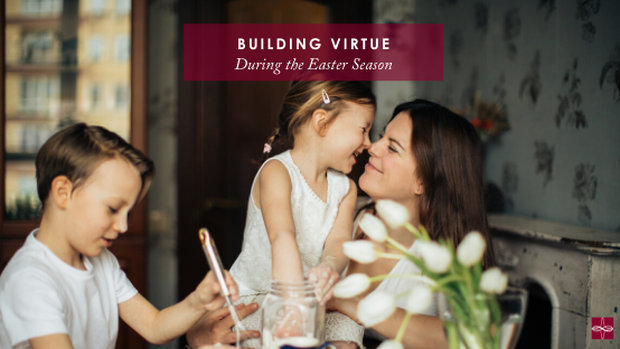





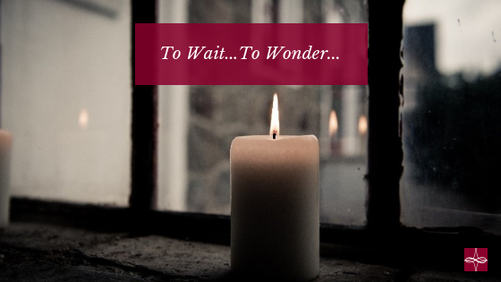



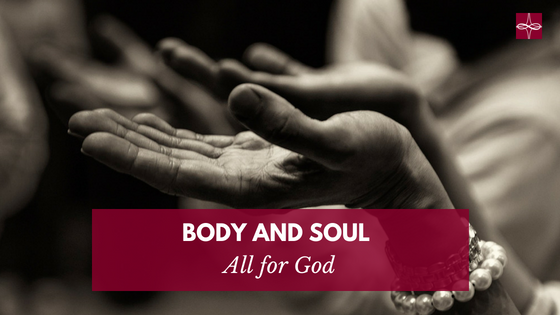

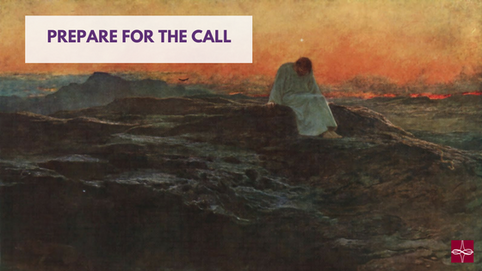







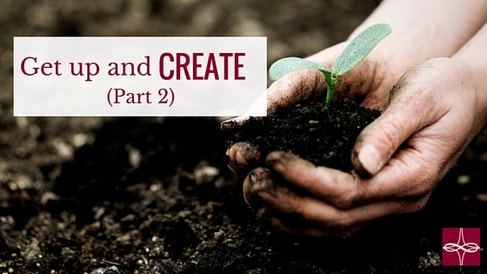



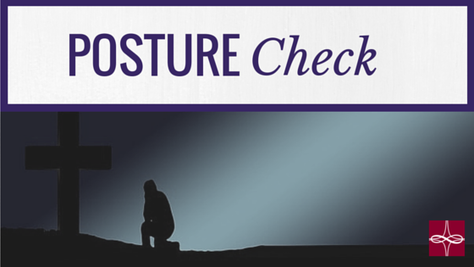



 RSS Feed
RSS Feed